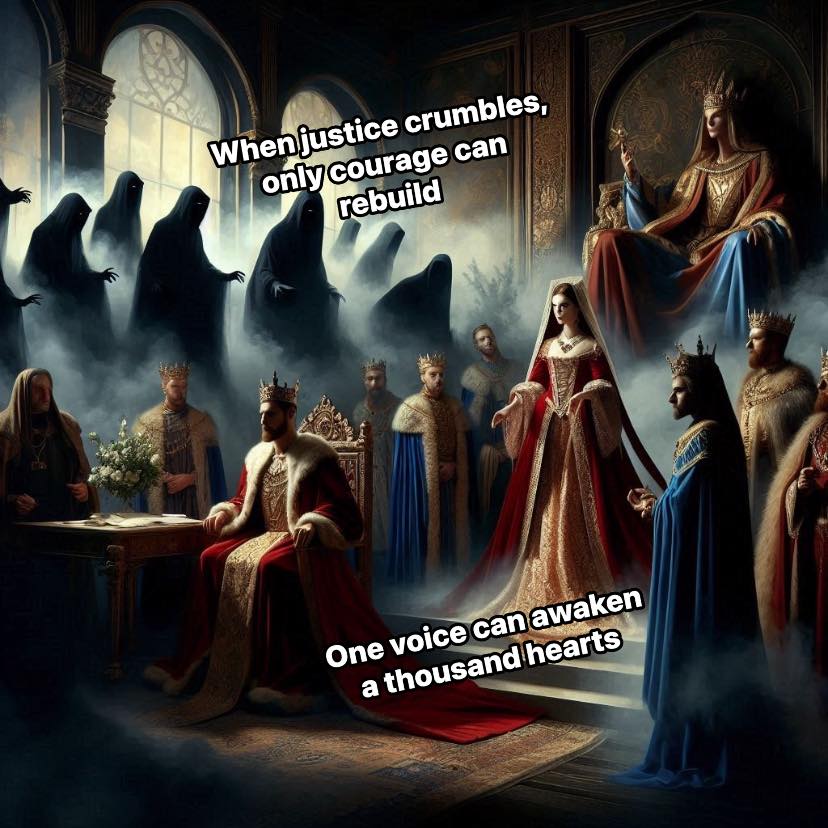
Long ago, in the heart of a fertile valley, there thrived a kingdom named Liora. Its lands were abundant, its people prosperous, and its leaders known for their wisdom and fairness. Liora was a beacon of justice and virtue, and its scholars were celebrated for their unwavering dedication to truth and morality.
Among the many things that set Liora apart was its devotion to teaching values to its young. In every school across the kingdom, children learned about the importance of truth, fairness, integrity, and service to others. The walls of the classrooms bore inscriptions of ancient proverbs: “Justice is the foundation of peace,” and “A leader’s strength lies in their virtue.” Teachers instilled in their students a deep respect for honesty and a commitment to the greater good.
But prosperity, as history often tells us, can be both a blessing and a test. Over time, whispers of greed began to creep into Liora’s royal court. The leaders, once committed to the welfare of their people, became enamored with power and personal gain. The scholars, instead of upholding truth, sought favor from the corrupt elite, exchanging their integrity for riches and influence.
At first, the changes were subtle. A bribe taken here, a favor granted there. But corruption is like a weed—it grows quickly if left unchecked. Soon, the kingdom’s laws, once symbols of fairness, became tools of exploitation. Justice was bought and sold, and the voices of the oppressed were silenced.
The people of Liora, including the children who had grown up learning the values of truth and justice, began to notice the hypocrisy of their leaders. Young students, who recited lessons about accountability in school, watched those in power defy those very principles with impunity. Teachers, once steadfast in their mission, struggled to explain why the rulers ignored the values they claimed to uphold.
“It feels as though we’re teaching lies,” one teacher confided to another. “How can we tell our students that integrity matters when the leaders prosper without it?”
Among the people of Liora was a young woman named Alina. A farmer’s daughter with a sharp mind and a heart that burned for justice, Alina could not bear to see the kingdom she loved fall into moral decay. She began to speak out, reminding the leaders and scholars of the principles upon which Liora had been built—truth, mindfulness, and justice.
Her words were like arrows, piercing the hardened hearts of the powerful. But rather than awakening their conscience, her reminders provoked their wrath.
“Who is this girl to question us?” scoffed the ministers. “We are a superior kingdom; we can bend or break our principles as we see fit.”
“She knows nothing of ruling a kingdom,” sneered the scholars.
“Her words are a threat to our stability,” whispered the courtiers.
Alina was mocked, ridiculed, and labeled a troublemaker. The more she spoke, the more the powerful sought to undermine her. They called her a dreamer, a fool, even a liar. When she urged them to reflect on their actions, they laughed bitterly.
“Even if the heavens opened and angels descended to show us another way, we would not believe,” one of the ministers declared mockingly. “What we do is necessary. The people need leaders, not sermons.”
But Alina’s words resonated deeply with the common people. She often said, “Our kingdom is like a weaver who spends days crafting a beautiful tapestry, only to unravel it thread by thread. We are tearing apart the values that once bound us together.” Farmers, merchants, and artisans began to gather around her, inspired by her courage and her longing to restore the Liora of old. Her movement grew steadily, and with it, so did the anger of the rulers. Desperate to maintain control, they tightened their grip, wielding fear as their weapon to suppress dissent.
As years passed, Liora’s decline accelerated. The once-prosperous fields grew barren, as dishonest leaders diverted funds meant for irrigation into their own coffers. Trade routes faltered under the weight of heavy taxes imposed to sustain the lavish lifestyles of the elite. Trust among the people eroded, as neighbors turned against one another, mimicking the self-interest they saw in their leaders.
Children in the schools, once filled with hope, grew disillusioned. They no longer believed the lessons their teachers taught, for the world outside their classrooms told a different story—one of betrayal, greed, and injustice.
Alina, now older and wearier, watched her beloved kingdom crumble. “The roots of corruption,” she told her followers, “run deep. But if we do not plant the seeds of integrity now, even knowing we may not live to see them bloom, Liora will be lost forever.”
One fateful night, as Alina prepared to address a gathering in the town square, soldiers stormed in and dragged her away. Her voice was silenced, but her message endured. Her followers continued to spread her words, even as the kingdom’s collapse became inevitable.
Years later, when Liora lay in ruins—its leaders overthrown, its scholars forgotten, its people scattered—Alina’s writings were rediscovered. They were a painful reminder of what had been lost and a guide for rebuilding what could be.
“Truth and justice,” she had written, “are the pillars of a nation. When they crumble, so too does the nation itself. But even in the darkest times, those who believe in them must persevere. For though corruption may flourish for a season, it can never endure.”
And so, from the ashes of Liora, a new generation emerged—one that sought to learn from the past, to rebuild on the foundations of truth and integrity, and to guard the lessons Alina had left behind.
Her story became a timeless reminder: when a nation falls prey to corruption, it is not the voices of the oppressors that shape its legacy, but the courage of those who dare to speak the truth—even when the world refuses to listen.

